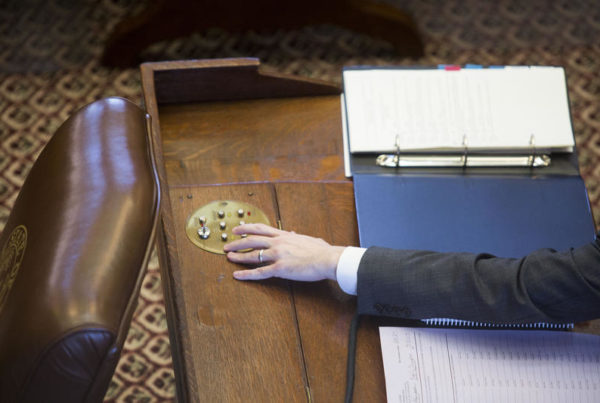By one estimate, workers nationwide are owed billions for work they did, but were under-paid, or not paid at all.
It’s called, “wage theft.” And it’s a problem here in Houston, that the city tried to address. More on how that worked out in a minute.
But first, just what constitutes wage theft?
It takes many forms. Not paying workers overtime they are entitled to, working off-the-clock, minimum wage violations, incorrectly categorizing employees as independent contractors, illegal deductions in pay, and not paying workers at all are all common examples of wage theft.
Stealing workers’ wages is an issue that even compelled President Barack Obama to implement an executive order back in 2014 which, in part, discouraged businesses from committing wage theft, by not allowing them to receive federal contracts. That was repealed by President Donald Trump back in March.
Tom Padgett is a lawyer in Houston, who says he represents lots of wage theft cases.
“The problem is that employers hold all the cards. And employees are afraid. They are afraid of retaliation…. I mean, we’ve had employees who have asserted their rights, and then the employers fire them, and they lose their house. Or they can’t afford their health insurance anymore, and their baby gets sick. So there’s a lot of terrible stories out there,” Padgett says.
The Fair Labor Standards Act (commonly known as FLSA) is a federal statute, put in place to ensure proper payment for workers. But Padgett’s firm says federal and state agencies don’t really have the man power to truly enforce that.
“There’s no specific Texas wage and hour law that would protect people,”Padgett said. “We have to go to federal court or we have to get a municipality, or a local ordinance, like Houston. But I haven’t seen any impact from the Houston ordinance, or any change at all.”
Padgett is referring to the Houston Wage Theft Ordinance, which was passed in 2013. It was put in place to deter businesses from stealing worker’s wages, by banning violators from working with the city. The ordinance even effectively bans businesses from operating in Houston, by way of not being able to renew permits and licenses.
But, city data indicates that nearly four years later, 25 complaints have been filed under the ordinance, but all are still “under investigation.” Not one claim has been resolved. In an e-mail, The City of Houston Legal Department said, “The investigations should be completed within the next 180 days.” But, did the people behind the ordinance expect it to take that long?
Before Sheriff Ed Gonzalez was Harris County sheriff, he was on the Houston City Council, where he helped pass the city’s Wage Theft Ordinance. Gonzalez says now would be a good time to reassess how the ordinance is working.
“It’s definitely a red flag…. But not necessarily to cast blame, just definitely to see, ‘How we can improve the process?’” he says. “I do hope that the current administration, Mayor Turner, and others can look at it to see how it can be improved upon, where are the gaps in responsiveness…. It just creates a lack of trust by those who come forward report it.”
At a recent City Council Meeting, Mayor Sylvester Turner addressed the issue of wage theft: saying the City takes claims very seriously. He also added that any retaliation against such claims is unacceptable.
Lee Poole works as a security officer, and says her employer doesn’t pay her for required off-the-clock work. I met up with her at City Hall after she met with a city council member, to see if she can gain support for a wage theft claim against her employer.
“A lot of people are scared to come forward, and speak out. But I’m here to do that for them,” Poole said. “I live from paycheck to paycheck. I’m a 60-year-old woman. A single woman, trying to make it…. But, I love my job. So I’m hanging in there…. But the thing is, I want it done right: so we can get paid for our lost time and wages. It’s time. You know what I’m saying?”
Pool’s colleague, Sarpaul Mehat says the $5,000 he says he’s owed could go a long way.
“Basically, I have a surgery coming up…. I have to help out with the bills with my mom and dad. There’s important needs I need to take care of,” he said. “It’s very frustrating. That’s why I’m here. That’s why I would like a union, so my voice can be heard, and I can actually see changes happen…. If you’re owed something, you should receive it.”
Lawyer Tom Padgett says the first step to the fight against Wage Theft is for workers to know their rights.
“The real problem is a lack of education of people having some idea of what their rights are…. We say a lot if you don’t exercise your rights, you don’t have them. And if people don’t know what their rights are, they can’t exercise them,” Padgett said.
The Texas Pay Day Law (TPL), assists employees in the recovery of unpaid wages (it doesn’t apply to independent contractors). To file a complaint with the Texas Workforce Commission, click here.
The Fair Labor Standards Act is designed to help workers receive fair pay. For more details on what it entails, click here. To file a wage theft complaint with the U.S. Department of Labor, click here.
And finally, to file a wage theft claim with Houston’s Office of the Inspector General, you can find the PDF here. Items filed here would fall under Houston’s Wage Theft Ordinance.
Padgett says you don’t have to file a complaint with the Texas Workforce Commission or the Department of Labor before filing a lawsuit. A person with a wage theft claim can file a lawsuit, without the need for either agency to investigate.
















